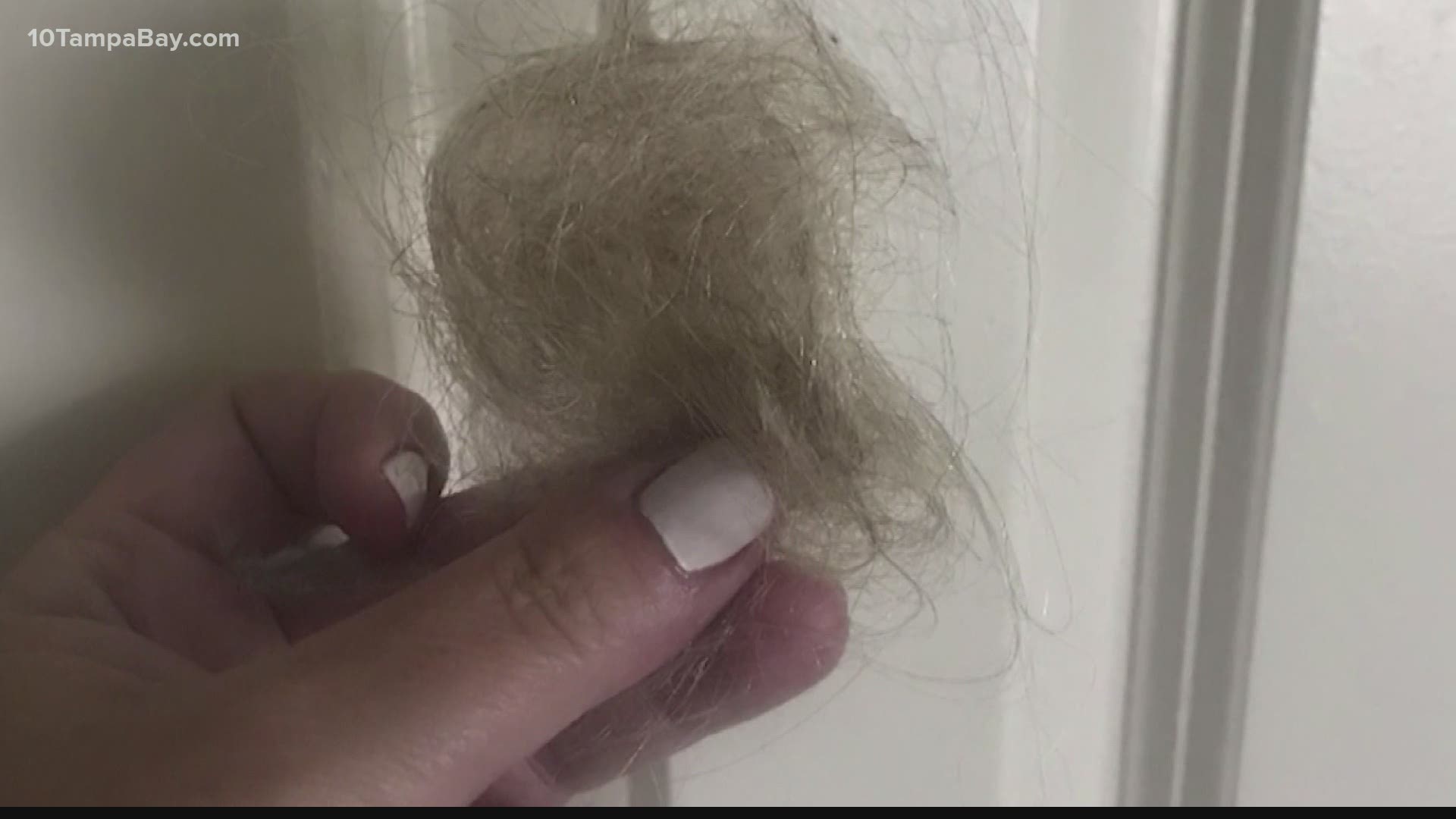TAMPA, Fla. — Amid the pandemic, you may have heard about so-called long haulers of the coronavirus who are losing their hair.
Some people who have recovered or are still experiencing symptoms say they've suddenly experienced hair loss.
Over the last several months, doctors like board-certified dermatologist Dr. Priya Nayyar of Dermaclinique in St. Petersburg, say they’ve seen a number of patients experiencing those symptoms.
“We’re seeing two to three times the amount of patients for hair loss,” Nayyar said.
She says the symptoms are the same: “they’ll say I’m brushing my hair and I’m just taking globs and globs of hair out of my brush, or there’s a lot of hair on my pillow or I’m clogging up the sink drain or the shower drains. My hair is just shedding all over the place.”
Annrene Rowe began losing her hair about three months after a 12-day stay in the hospital for COVID-19.
“When I was getting ready for our wedding anniversary July 17, I had noticed, gah, my hair feels funny. The next day I started having big clumps of hair… then I started noticing bald spots," she said.
She’s a long hauler of the virus -- still experiencing issues like shortness of breath, a burning sensation on her skin and hair loss more than six months after she was released from the hospital. Her battle with COVID-19 included a stay in the I.C.U.
“I had a fever that spiked to 104.2 and they wrapped me in ice bags," she said.
Nayyar said the coronavirus itself is not the root cause.
“This is a common disease that we do see in dermatology. It’s called telogen effluvium, where the resting hairs just go into this abrupt shedding and the hairs that normally grow also transition into this shedding phase," she said.
“We don’t think it’s related to actually having the virus itself, but more so the emotional stress that the pandemic has had on these people," she said.
Nayyar says there’s no strong data suggesting that the coronavirus attacks the hair follicles. The hair loss in patients happens typically two to three months after an illness, just like in Rowe’s experience.
For now, Rowe said she's covering it with wigs.
“I still don’t have much hair and I lost about 75 percent of my hair,” she said.
She said she’s noticed regrowth on her front hairline about four months later. In the meantime, she’s relied heavily on the support of others facing an ongoing battle with the virus – including Facebook groups like COVID-19 Long-Haulers Outreach.
She calls the access it provides to others and information, “a lifesaver, a soul soother. When I had any kind of question about it I can go right on there and get a response.”
The good news for people like Rowe is that the condition is temporary and the hair will grow back, with patience.
“This is common and it is going to stop. The hairs will regrow. You may still have the shedding for six months and then it will slowly regrow. So it can take almost up to a year to get your hairs back," Nayyar said.
She suggests talking to your doctor about your symptoms to make sure there’s no other underlying cause and to focus on your health.
“Having a well-balanced diet, having a lot of proteins because proteins are the building blocks of our hair, nails and skin," she said.
She also suggests a daily multi-vitamin to help spur hair growth.
What other people are reading right now:
- Cindy McCain says her husband would have been 'very pleased' by Biden's win, report says
- Tracking Eta: Latest track from NHC shifts west, takes Tampa Bay out of the forecast cone
- Navy sailor from Florida killed in Pearl Harbor laid to rest nearly 80 years later
- 'I am worried': Hospital staff monitoring rise in cases in Tampa Bay, urge communities to use COVID-19 mitigation measures
- Pfizer says early data signals COVID-19 vaccine is effective
- 2020 Election Results | Get live results from 10 Tampa Bay
►Breaking news and weather alerts: Get the free 10 Tampa Bay app
►Stay In the Know! Sign up now for the Brightside Blend Newsletter

